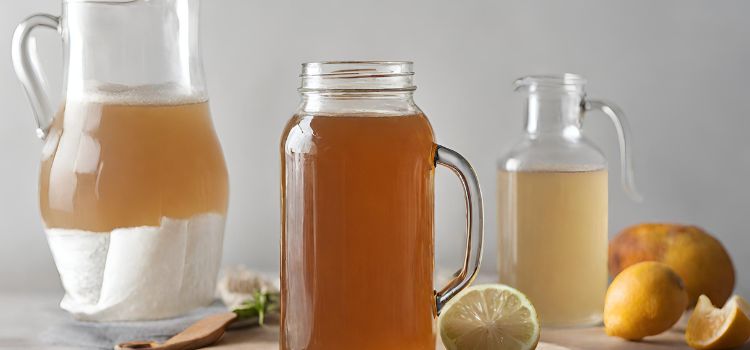
Yes, you can drink kombucha while breastfeeding. It is generally considered safe in moderation. However, it’s essential to be cautious and consume it in small quantities because kombucha contains trace amounts of alcohol and caffeine, which can potentially transfer to breast milk.
Understanding The Basics Of Kombucha
Discover the essentials of kombucha and its potential effects on breastfeeding. Gain insight into whether it is safe to consume during this stage and the factors to consider for a balanced approach.
What Is Kombucha?
- Kombucha is a fermented tea beverage that has gained popularity in recent years due to its potential health benefits.
- It is made by adding a SCOBY (symbiotic culture of bacteria and yeast) to brewed tea, which then undergoes fermentation.
- The fermentation process converts sugar into organic acids, enzymes, and probiotics, resulting in a tangy and fizzy drink.
How Is Kombucha Made?
- Brewed tea is combined with sugar and allowed to cool.
- A SCOBY is added to the tea mixture, providing the bacteria and yeast necessary for fermentation.
- The mixture is left to ferment for about a week, during which time the SCOBY consumes the sugar, producing various beneficial compounds.
- Once the fermentation is complete, the kombucha is strained and may be flavored with fruits, herbs, or spices before being bottled and refrigerated.
What Are The Potential Benefits Of Kombucha?
- Probiotics: Kombucha contains live bacteria and yeast that can contribute to a healthy gut microbiome. These probiotics may improve digestion and support immune function.
- Antioxidants: The fermentation process creates antioxidants that can help protect the body against cell damage caused by free radicals.
- Detoxification: Kombucha contains organic acids, such as acetic acid, which may assist in detoxifying the body by enhancing liver function.
- Digestive health: The probiotics in kombucha can promote a healthy balance of gut bacteria, potentially improving digestion and reducing gastrointestinal issues.
- Mental well-being: Some studies suggest that the probiotics and antioxidants found in kombucha may have a positive impact on mental health by reducing anxiety and depression symptoms.
Kombucha is a fermented tea beverage with potential health benefits. It is made by adding a SCOBY to brewed tea and allowing it to ferment over a week. Kombucha contains probiotics, antioxidants, and organic acids that may support gut health, detoxification, and mental well-being.
However, it is important to note that further research is needed to fully understand the potential benefits of kombucha and its effects on breastfeeding mothers.
The Safety Of Consuming Kombucha While Breastfeeding

Kombucha can be safely consumed while breastfeeding as long as it is pasteurized and consumed in moderation. It is important to consult with a healthcare professional for personalized advice.
Kombucha, a fermented tea beverage known for its potential health benefits, has gained popularity among people of all ages. But what about breastfeeding mothers? Can they enjoy the tangy and fizzy drink without any concerns?
Let’s examine the safety of consuming kombucha while breastfeeding, taking into account any potential risks, effects on breast milk production, and impact on breastfeeding infants.
Are There Any Risks Associated With Kombucha?
Kombucha is generally considered safe for most individuals, but it’s essential to be aware of a few potential risks for breastfeeding mothers:
- Unpasteurized kombucha: Some store-bought or homemade kombucha may contain a small amount of alcohol due to fermentation, which can be a concern for breastfeeding mothers trying to avoid alcohol intake.
- Contamination: Improper brewing or storage of kombucha can lead to contamination by harmful bacteria and fungi, posing a risk to both the mother and the breastfeeding infant.
Can Kombucha Affect Breast Milk Production?
While no scientific evidence directly links kombucha consumption to breast milk production, it’s crucial to note that kombucha contains caffeine and some trace amounts of alcohol due to natural fermentation. These substances can potentially affect breast milk production in some individuals.
However, the impact is likely to be minimal unless consumed excessively.
How Does Kombucha Consumption Impact Breastfeeding Infants?
Breastfeeding infants have delicate digestive systems, so it’s essential to consider any potential effects kombucha consumption may have on them:
- Alcohol content: If kombucha contains higher levels of alcohol due to fermentation, it may pass into breast milk and affect the baby’s development and behavior.
- Caffeine content: Kombucha contains caffeine, and excessive intake can lead to irritability, poor sleep, and increased bowel movements in breastfeeding infants.
To ensure the safety of both the mother and the breastfeeding infant, it is advisable for breastfeeding mothers to take the following precautions:
- Consult a healthcare professional before consuming kombucha while breastfeeding.
- Opt for commercially produced, pasteurized kombucha with an alcohol content of 0.5% or less.
- Start with small amounts and monitor for any adverse reactions in the breastfeeding infant.
- If any concerns arise, discontinue kombucha consumption and seek medical advice.
Remember, every individual’s breastfeeding journey is unique. It’s crucial to prioritize the well-being of both the mother and the breastfeeding infant and make informed decisions regarding the consumption of kombucha or any other food or beverage during this special time.
Stay informed, listen to your body, and consult healthcare professionals when needed.
Factors To Consider When Consuming Kombucha While Breastfeeding
Consider these factors before drinking kombucha while breastfeeding, as it contains small amounts of alcohol and caffeine. It’s important to consult with your healthcare provider to ensure it’s safe for you and your baby.
Kombucha is a fermented tea beverage that has gained popularity for its potential health benefits. However, if you are a breastfeeding mother, you may be wondering if it is safe to consume kombucha while nursing. There are several factors to consider when deciding whether or not to include kombucha in your diet while breastfeeding.
The Quality Of The Kombucha
- It is crucial to choose high-quality kombucha from reputable brands or prepare it at home using safe and sanitary methods.
- Look for organic and unpasteurized varieties, as pasteurization may alter the probiotic content.
- Ensure that the kombucha is properly stored and hasn’t expired to maintain its freshness and quality.
The Caffeine And Alcohol Content In Kombucha
- Kombucha is typically low in caffeine, especially if it has undergone a longer fermentation process. However, some varieties may contain higher levels of caffeine.
- Check the label or consult the manufacturer to determine the caffeine content of the kombucha.
- Some kombucha varieties may contain trace amounts of alcohol, generally less than 0.5%. However, it is essential to be cautious and choose kombucha with minimal or no alcohol content.
The Presence Of Any Added Ingredients Or Flavors
- Some kombucha brands may add additional ingredients or flavors to enhance the taste or provide health benefits.
- Check the label for any added herbs, spices, or extracts. If you have any concerns about the safety or compatibility of these ingredients with breastfeeding, consult with your healthcare professional.
- Opt for plain, unflavored kombucha for a more natural and simple option.
Considering these factors will help you make an informed decision about consuming kombucha while breastfeeding. Remember, it’s always a good idea to consult with your healthcare provider before incorporating any new food or beverage into your diet, especially during the breastfeeding phase.
Potential Benefits Of Consuming Kombucha While Breastfeeding

Discover the potential benefits of incorporating kombucha into your diet while breastfeeding. This fermented drink may provide probiotics and essential nutrients, supporting your overall health and digestion during this important stage of motherhood.
Kombucha has gained popularity in recent years for its supposed health benefits, but what about when you’re breastfeeding? Can you still enjoy this fizzy fermented beverage without worrying about any potential negative effects on your baby’s health?
In this blog post, we will delve into the topic of whether drinking kombucha while breastfeeding is safe and explore the potential benefits it may offer for new moms.
Can Kombucha Help With Digestion And Gut Health?
- Kombucha is a probiotic-rich drink that contains live bacteria and yeast, which can support healthy digestion.
- Probiotics can help balance the gut microbiome and aid in the breakdown and absorption of nutrients.
- Improved digestion can lead to reduced discomfort such as bloating, gas, and constipation.
Can Kombucha Provide A Natural Energy Boost For New Moms?
- The fermentation process of kombucha produces B vitamins, which play a crucial role in energy production.
- B vitamins can help combat fatigue and boost energy levels, offering a natural pick-me-up for tired moms.
- Kombucha also contains a small amount of caffeine, which can provide a mild energy boost.
Does Kombucha Have Any Mood-Enhancing Properties?
- Some research suggests that the gut-brain connection may influence mood and mental health.
- The probiotics in kombucha can positively impact the gut microbiome, potentially supporting mental well-being.
- The B vitamins in kombucha are also essential for neurotransmitter production, which can affect mood regulation.
Drinking kombucha while breastfeeding can offer potential benefits for new moms. From aiding digestion and gut health to providing a natural energy boost and potentially enhancing mood, the probiotics and B vitamins found in kombucha may offer support during this demanding time.
However, it’s essential to consume kombucha in moderation and listen to your body’s needs. As always, consult with your healthcare provider before making any significant changes to your diet while breastfeeding.
Guidelines For Safely Consuming Kombucha While Breastfeeding

Safely consuming kombucha while breastfeeding requires following these six guidelines. It is important to consider the quality, quantity, alcohol content, and possible side effects of kombucha to ensure the health and safety of both mother and baby. Consultation with a healthcare professional is recommended.
Kombucha has gained popularity as a healthy beverage with potential benefits for gut health and immunity. But if you’re a breastfeeding mom, you might be wondering if it’s safe to indulge in this fizzy drink. Here are some guidelines to consider:
How Often Should Kombucha Be Consumed?
To ensure the safety of your breastfeeding journey, it’s crucial to be mindful of your kombucha consumption. While each individual is different, experts recommend following these general guidelines:
- Limit yourself to no more than one serving of kombucha per day.
- It’s advisable to start with a smaller amount, such as half a serving, and gradually increase if your body tolerates it well.
What Is The Recommended Serving Size?
Understanding the appropriate amount of kombucha to consume can help you strike a balance between enjoying its benefits and being cautious. Consider the following tips:
- Stick to a serving size of 4 to 8 fluid ounces (120 to 240 milliliters) per day.
- Pay attention to your body’s reactions and adjust the serving size accordingly.
- Remember, moderation is key when incorporating kombucha into your breastfeeding routine.
Are There Any Specific Brands Or Types Of Kombucha That Are Safer For Breastfeeding Moms?
Choosing the right kombucha brand can provide additional peace of mind as a breastfeeding mom. Consider the following recommendations:
- Opt for reputable brands that prioritize quality control and follow strict manufacturing practices.
- Look for kombucha brands that ensure their products contain low levels of alcohol, generally under 0.5%.
- Seek out kombucha made from organic ingredients to minimize exposure to pesticides and other potential contaminants.
Remember, it’s always a good idea to consult with your healthcare provider before making any significant changes to your diet, especially when you’re breastfeeding. They can provide personalized guidance based on your individual circumstances.
By following these guidelines, you can enjoy the benefits of kombucha while nurturing your breastfeeding journey. Remember to listen to your body and prioritize moderation for a safe and enjoyable experience.
Alternatives To Kombucha For Breastfeeding Moms
Breastfeeding? Explore safe options beyond Kombucha to maintain a healthy lifestyle for you and your baby.
While kombucha offers a range of health benefits for many, it’s understandable if you have concerns about consuming it while nursing. Fortunately, there are several alternatives to kombucha that can provide similar benefits without the potential risks.
Whether you’re looking for other beverages that offer similar benefits or non-alcoholic, caffeine-free options, we’ve got you covered. Let’s explore some options:
Are There Any Other Beverages That Provide Similar Benefits?
- Water kefir: This fermented drink is similar to kombucha but is typically made with water kefir grains instead of tea. It contains beneficial bacteria and yeasts, making it a great alternative for breastfeeding moms.
- Jun tea: Jun is similar to kombucha, but it’s made with green tea and honey instead of black tea and sugar. It has a milder flavor and can offer similar health benefits.
- Fermented herbal tea: If you’re looking for a caffeine-free option, fermented herbal teas such as hibiscus or chamomile can be a great choice. These teas are infused with beneficial bacteria and provide a refreshing alternative to kombucha.
What Are Some Non-Alcoholic, Caffeine-Free Options For Breastfeeding Moms?
- Herbal infusions: Herbal infusions are made by steeping herbs in hot water for an extended period of time. They are a great caffeine-free alternative to tea and provide hydration and various health benefits. Some popular herbal infusions include nettle, raspberry leaf, and ginger.
- Fruit-infused water: Jazz up your regular water intake by infusing it with slices of fresh fruits such as citrus fruits, berries, or cucumber. This adds a hint of flavor without any added sugars or caffeine.
- Vegetable juices: Freshly made vegetable juices can be a nutrient-packed alternative to kombucha. Try juicing vegetables like carrots, beets, spinach, or kale for a delicious and nutritious beverage.
Remember, always consult with your healthcare provider before making any changes to your diet while breastfeeding. These alternatives to kombucha can be a healthy addition to your daily routine, but it’s essential to ensure they align with your personal needs and health goals.
Stay hydrated and enjoy exploring the various beverage options available to you as a breastfeeding mom!
Frequently Asked Questions
What Drinks To Avoid When Breastfeeding?
Avoid alcoholic, caffeinated, and sugary drinks while breastfeeding to ensure a healthy milk supply and the baby’s well-being.
Can You Drink Remedy Kombucha While Breastfeeding?
Yes, you can drink remedy kombucha while breastfeeding.
Is Kombucha Good Postpartum?
Yes, kombucha can be beneficial for postpartum recovery due to its probiotics and nutrients.
Wrapping Up
Considering all the information presented, it is generally safe for breastfeeding mothers to consume kombucha in moderation. However, it is important to remember that everyone is different, and what works for one person may not work for another.
Before incorporating kombucha into your diet while breastfeeding, it is always best to consult with a healthcare professional or lactation consultant.
They can provide personalized advice based on your individual circumstances and any potential health concerns. Additionally, it is crucial to choose a reputable brand of kombucha that is low in alcohol content and free from any additives or potential allergens.
By making informed choices and listening to your body, you can enjoy the potential health benefits of kombucha while nourishing your baby. Remember, your well-being is just as important as providing for your little one, so prioritize your health as you navigate this exciting journey of motherhood.
Leave a Reply